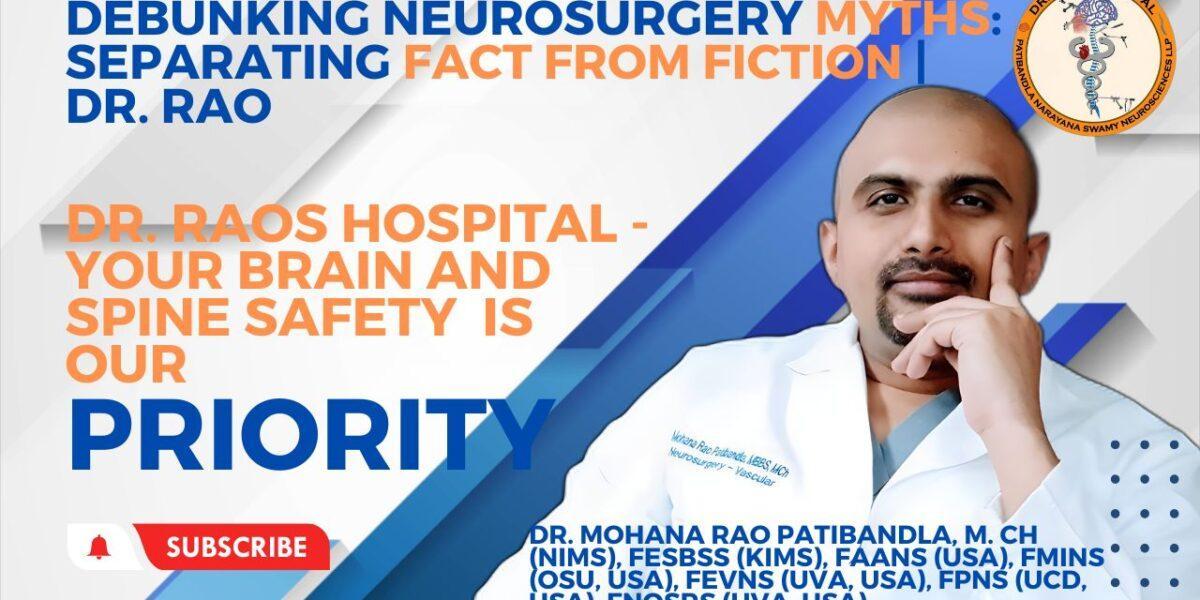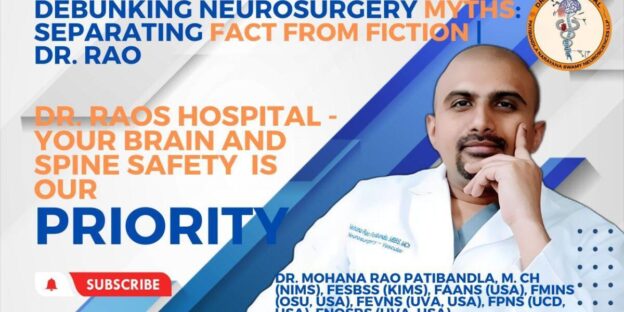Debunking Neurosurgery Myths: Separating Fact from Fiction | Dr. Rao
Neurosurgery Myths vs. Facts: Debunking Common Misconceptions
Summary: This informative video delves into neurosurgery to debunk common myths and provide factual information. Joined by renowned neurosurgeon Dr. Rao, we explore various misconceptions surrounding neurosurgery, such as the risks involved, the recovery process, and accessibility. By separating fact from fiction, we aim to empower viewers with accurate knowledge about neurosurgery, enabling them to make informed decisions regarding their health and well-being. Join us in dispelling myths and embracing the truth about neurosurgery’s transformative potential.
Introduction
Neurosurgery is a complex field that deals with diagnosing, treating, and managing disorders affecting the brain, spine, and nervous system. However, several neurosurgery myths and misconceptions often lead to misunderstandings and unnecessary fear. This blog aims to debunk these common misconceptions and provide accurate information about neurosurgery. We are proud to have Dr. Rao, the best neurosurgeon in India, and Dr. Rao’s hospital, the leading neurosurgery hospital in Guntur and India, as our trusted sources. Let’s separate myths from facts and gain a better understanding of neurosurgery. Watch More On YouTube
Myth 1: Neurosurgery is always risky.
Fact: While neurosurgery involves intricate procedures, advancements in technology and techniques have significantly reduced the risks associated with these surgeries. Dr. Rao and his team at Dr. Rao’s hospital prioritize patient safety and employ the latest innovations to ensure successful outcomes with minimal complications.
Myth 2: Neurosurgery always requires an extended hospital stay and recovery period.
Fact: Thanks to minimally invasive techniques, many neurosurgical procedures can be performed on an outpatient basis or with shorter hospital stays. Dr. Rao and his team specialize in minimally invasive neurosurgery, allowing faster recovery and reduced post-operative discomfort.
Myth 3: Only severe neurological conditions require neurosurgery.
Fact: Neurosurgery encompasses many conditions, from brain tumors and spinal cord injuries to chronic pain and movement disorders. Dr. Rao’s expertise extends to various neurosurgical subspecialties, ensuring comprehensive care for patients with diverse neurological conditions.
Myth 4: Neurosurgery always involves open skull procedures.
Fact: While open skull procedures are necessary for some instances, many neurosurgical procedures can be performed using minimally invasive techniques. These techniques involve smaller incisions, reduced tissue disruption, and faster recovery times. Dr. Rao’s proficiency in minimally invasive neurosurgery allows for precise treatment with minimal scarring and a quicker return to normal activities.
Myth 5: Neurosurgery is only for adults; children cannot undergo neurosurgical procedures.
Fact: Pediatric neurosurgery is a specialized field that focuses on diagnosing and treating neurological conditions in children. Dr. Rao’s hospital offers comprehensive pediatric neurosurgical care, ensuring that young patients receive the specialized attention and expertise they need.
Here are some more myths
Myth 1: Neurosurgery is always risky.
Fact: While all surgeries carry some level of risk, advancements in technology and surgical techniques have significantly improved the safety and outcomes of neurosurgery. With the expertise of skilled neurosurgeons like Dr. Rao, the risks can be minimized, and the benefits can outweigh the potential complications.
Myth 2: Neurosurgery is only for emergencies or life-threatening conditions.
Fact: While neurosurgery is often performed in emergencies, it is also used to treat a wide range of non-emergency conditions, such as chronic pain, movement disorders, brain tumors, and spinal deformities. Neurosurgeons work closely with patients to develop personalized treatment plans for optimal outcomes.
Myth 3: Recovery from neurosurgery is always long and challenging.
Fact: Recovery from neurosurgery varies depending on the type and complexity of the procedure. While some surgeries may require extended recovery, many patients experience significant improvement shortly after surgery. Advanced techniques like minimally invasive surgery can also help reduce recovery time and post-operative discomfort.
Myth 4: Neurosurgery always leaves visible scars.
Fact: With the advent of minimally invasive techniques, many neurosurgical procedures can now be performed through small incisions. These incisions are strategically placed to minimize visible scarring. Dr. Rao’s expertise in minimally invasive neurosurgery ensures that patients can enjoy the benefits of surgery with minimal scarring.
Myth 5: Neurosurgery is only for the elderly.
Fact: Neurosurgery is not limited to any specific age group. It can be performed on patients of all ages, from newborns to older adults. Conditions like brain tumors, spinal disorders, and congenital anomalies can affect individuals at any stage of life, and neurosurgery offers treatment options for patients across the age spectrum.
Myth 6: Neurosurgery always requires a lengthy hospital stay.
Fact: While some complex neurosurgical procedures may require a more extended hospital stay, many surgeries can be performed on an outpatient basis or with a short hospital stay. Advances in surgical techniques and anesthesia allow faster recovery and reduced hospitalization, enabling patients to return to everyday lives more quickly.
Myth 7: Neurosurgery is the last resort after all other treatments fail.
Fact: Neurosurgery is not always a last resort. In some cases, it may be the most effective and appropriate treatment option right from the start. Neurosurgeons like Dr. Rao carefully evaluate each patient’s condition and develop individualized treatment plans, considering surgical and non-surgical options.
Myth 8: Neurosurgeons only treat brain conditions.
Fact: Neurosurgeons are specialized in treating conditions affecting the entire nervous system, including the brain, spine, and peripheral nerves. They address various conditions, such as brain tumors, spinal disorders, cerebrovascular diseases, and peripheral nerve injuries.
Myth 9: Neurosurgery always leads to permanent loss of function or cognitive abilities.
Fact: While surgery carries risks, neurosurgeons prioritize preserving and improving function. With precise surgical techniques, advanced imaging, and intraoperative monitoring, neurosurgeons can minimize the risk of complications and maximize functional outcomes.
Myth 10: Neurosurgery is not accessible or affordable for everyone.
Fact: Neurosurgery is becoming more accessible and affordable with advancements in medical technology and healthcare systems. Dr. Rao’s hospital strives to provide high-quality neurosurgical care while ensuring it is accessible to patients from diverse backgrounds. They work with insurance providers and offer various payment options to make treatment more affordable.
Remember, understanding the facts about neurosurgery is essential for making informed decisions about your health. Consult with experts like Dr. Rao to dispel myths and get accurate information tailored to your condition.
Conclusion
Understanding the truth behind common neurosurgery myths is essential for informed decision-making and alleviating unnecessary fears. Dr. Rao, the best neurosurgeon in India, and Dr. Rao’s hospital, the top neurosurgery hospital in Guntur and India, are committed to providing accurate information and exceptional neurosurgical care. If you have any concerns or questions about neurosurgery, don’t hesitate to contact Dr. Rao at 9010056444 or visit https://drraoshospitals.com. Remember, knowledge is power, and debunking myths brings us one step closer to a better understanding neurosurgery.
Tags: neurosurgery myths, debunking misconceptions, facts about neurosurgery, Dr. Rao, the best neurosurgeon in India, neurosurgical procedures, understanding neurosurgery, separating fact from fiction


